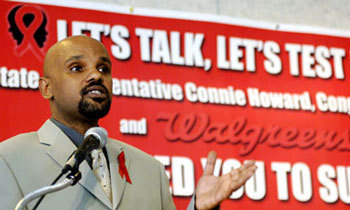
CHICAGO (FinalCall.com) – If you have difficulty running, you can ride a bike; if you don’t have a bike, you can walk–no one is excluded from participating in the “I Need You To Survive” African American HIV/AIDS Walk & Bike Ride scheduled for May 20.
The 5K trek through the heart of the Black community is the 4th annual signature event of the Let’s Talk, Let’s Test Foundation, a collaboration of elected officials, government agencies, businesses, faith-based and community service organizations organized to establish a competent infrastructure of services and information within Black communities statewide, primarily focused on prevention.
“The only weapon we have is prevention,” insisted Lloyd Kelly, executive director of the foundation, during an April press and sponsor luncheon at Mercy Hospital to kick off the events leading to the walk. A clergy prayer breakfast was held Apr. 27 and the annual “Voice of the People Awards” ceremony is set for May 5 at the Garfield Park Conservatory. Post-walk activities on May 20 include a concert, health fair, testing, vending, food, fun and games for families to enjoy.
Mr. Kelly pointed out that the government spends an estimated $766 million nationally on HIV-related costs, out of which only $15 million is directed toward prevention measures. He added that the state of Illinois has allocated only 13 percent for prevention in its budget.
“HIV/AIDS is a real pandemic that has already killed half-a-million people in America and thousands in Chicago. It has robbed the world of so many bright and beautiful people in the prime of their lives,” lamented Chicago Health Commissioner Terry Mason during the luncheon.
He informed the gathering that 20,000 people in Chicago are living with AIDS, with 1,200 new infections a year. In Illinois, Blacks are only 15 percent of the population, yet account for 49 percent of all AIDS cases. According to the Centers for Disease Control, Black people account for 13 percent of the U.S. population, but are 72 percent of all newly reported HIV infections and over 50 percent of AIDS diagnoses. Nationally, Black women and teens are the fastest growing demographic for new infections and HIV is the leading cause for Black women ages 25-34, and Black men ages 35-44.
Mr. Mason further admonished that stigma should not be attached to HIV/AIDS any more than there is one for diabetes, asthma or domestic violence. “There are a lot of things that we need to talk about, things that have led our children to where we are not proud of,” he said. “We need to talk about how are we going to make people feel whole, respected and loved?”
Behind every number is a person’s relative, he continued, advocating for serious action because “the future of our community depends on it.”
Securing that future depends on the ability of direct HIV/AIDS service providers in the community focusing on delivering information and rather than chasing dollars to keep their doors open and services available. That’s why State Rep. Constance Howard has been heralded for founding the Let’s Talk, Let’s Test Foundation with Mr. Kelly in 2002–a synergy that led to two historic pieces of legislation in the country targeting prevention measures geared for Black people, the Illinois African American Response Fund and the Illinois African American HIV/AIDS Response Act.
The fund is a special allocation within the state treasury that must be used primarily for a comprehensive and culturally sensitive prevention of HIV transmission along with other programs and activities, such as creating and implementing a HIV/AIDS service delivery system in high risk Black areas, a statewide testing program and research. The act requires an increase in availability of HIV testing in state offices, creates Black HIV/AIDS Response Officers in state agencies to work as liaisons, permits a Medicaid waiver, and an extensive list of provisions required of the Department of Corrections, which include the entitlement to free testing, care, counseling and services of inmates and linking the website of the Illinois Department of Public Health to information on prevention and education targeting inmates and former prisoners on its website.
“It is about how do we sell the need to be healthy,” argued Illinois Public Health Director Eric Whitaker, while promoting the idea of social marketing at the luncheon, “because there is a good reason to live.”
(For more information on the “I Need You to Survive” Walk, call the Let’s Talk, Let’s Test Foundation at (773) 821-2830 or visit their website at www.ltltfoundation.org, or send an email to [email protected].)












